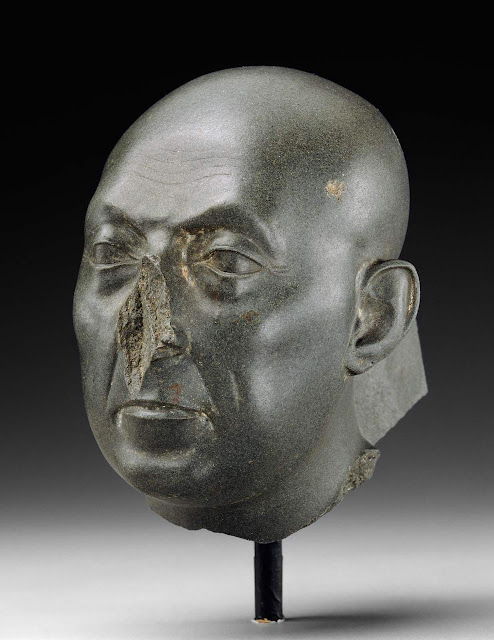Head of a priest known as the Boston Green Head, Egypt, Late Period, Dynasty 30
Head of a priest known as the Boston Green Head, Egypt, Late Period, Dynasty 30, 380-332 BCE from the Museum of Fine Arts Boston, Massachusetts.
The face of this Egyptian priest is wonderfully lifelike and individual. Light wavy lines indicate the furrows of his brow, and crow’s feet radiate from the outer corners of his eyes. The top of his nose has a pronounced bony ridge. Deep creases run from the edges of his nose to the corners of his mouth. Thin lips and a downturned mouth impart an expression of strength and determination. The slight wart on his left cheek is unique in Egyptian art and also introduces an element of asymmetry an attribute typically incorporated by artists of the Late Period. The head was discovered at Saqqara in the Serapeum in 1857-1858 during excavations by Auguste Mariette. It was subsequently given by Muhammad Said Pasha, viceroy of Egypt, to Prince Napoleon Joseph Charles Paul Bonaparte. It was then acquired by collector Edward Perry Warren in 1903 then purchased by the museum in 1904. Image courtesy of the Museum.
The face of this Egyptian priest is wonderfully lifelike and individual. Light wavy lines indicate the furrows of his brow, and crow’s feet radiate from the outer corners of his eyes. The top of his nose has a pronounced bony ridge. Deep creases run from the edges of his nose to the corners of his mouth. Thin lips and a downturned mouth impart an expression of strength and determination. The slight wart on his left cheek is unique in Egyptian art and also introduces an element of asymmetry an attribute typically incorporated by artists of the Late Period. The head was discovered at Saqqara in the Serapeum in 1857-1858 during excavations by Auguste Mariette. It was subsequently given by Muhammad Said Pasha, viceroy of Egypt, to Prince Napoleon Joseph Charles Paul Bonaparte. It was then acquired by collector Edward Perry Warren in 1903 then purchased by the museum in 1904. Image courtesy of the Museum.




Comments
Post a Comment